
The Winter Garden Theatre (1850)
Encyclopedia
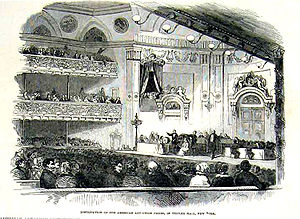
Variety show
A variety show, also known as variety arts or variety entertainment, is an entertainment made up of a variety of acts, especially musical performances and sketch comedy, and normally introduced by a compère or host. Other types of acts include magic, animal and circus acts, acrobatics, juggling...
shows to extravagant productions of the works of Shakespeare. Although the theatre burned to the ground several times, it rose from the ashes under different managers, bearing various names, to become known as one of the most important theatres in New York history.
A showcase for the finest in American theater
Some of the leading actors and theatre managers of the 19th century worked at The Winter Garden Theatre, from Jenny LindJenny Lind
Johanna Maria Lind , better known as Jenny Lind, was a Swedish opera singer, often known as the "Swedish Nightingale". One of the most highly regarded singers of the 19th century, she is known for her performances in soprano roles in opera in Sweden and across Europe, and for an extraordinarily...
and Laura Keene
Laura Keene
Laura Keene was a British-born American stage actress and manager. In her twenty-year career, she became known as the first powerful female manager in New York.-Early life:...
to Dion Boucicault
Dion Boucicault
Dionysius Lardner Boursiquot , commonly known as Dion Boucicault, was an Irish actor and playwright famed for his melodramas. By the later part of the 19th century, Boucicault had become known on both sides of the Atlantic as one of the most successful actor-playwright-managers then in the...
and Edwin Booth
Edwin Booth
Edwin Thomas Booth was a famous 19th century American actor who toured throughout America and the major capitals of Europe, performing Shakespearean plays. In 1869 he founded Booth's Theatre in New York, a spectacular theatre that was quite modern for its time...
. One of the most significant and politically influential productions in American theater history took place on a single night at The Winter Garden Theatre on November 25, 1864, when three sons of one of America's great tragedians, Junius Brutus Booth
Junius Brutus Booth
Junius Brutus Booth was an English actor. He was the father of John Wilkes Booth , Edwin Booth , and Junius Brutus Booth, Jr., an actor and theatre manager...
, namely Junius Brutus Booth, Jr.
Junius Brutus Booth, Jr.
Junius Brutus Booth, Jr. was an American actor and theatre manager.As a member of the illustrious Booth family of actors, Junius Brutus Booth, Jr. was overshadowed not only by his father Junius, Sr...
, Edwin Booth
Edwin Booth
Edwin Thomas Booth was a famous 19th century American actor who toured throughout America and the major capitals of Europe, performing Shakespearean plays. In 1869 he founded Booth's Theatre in New York, a spectacular theatre that was quite modern for its time...
, and John Wilkes Booth
John Wilkes Booth
John Wilkes Booth was an American stage actor who assassinated President Abraham Lincoln at Ford's Theatre, in Washington, D.C., on April 14, 1865. Booth was a member of the prominent 19th century Booth theatrical family from Maryland and, by the 1860s, was a well-known actor...
staged a benefit performance of Shakespeare's Julius Caesar
Julius Caesar (play)
The Tragedy of Julius Caesar, also known simply as Julius Caesar, is a tragedy by William Shakespeare, believed to have been written in 1599. It portrays the 44 BC conspiracy against...
to raise funds to build a statue of Shakespeare in Central Park; four months later John Wilkes would assassinate Abraham Lincoln
Abraham Lincoln
Abraham Lincoln was the 16th President of the United States, serving from March 1861 until his assassination in April 1865. He successfully led his country through a great constitutional, military and moral crisis – the American Civil War – preserving the Union, while ending slavery, and...
in Washington D.C. as he cried out the historic words of Brutus in ancient Rome. Throughout its seventeen-year history, The Winter Garden Theatre played a significant role in the history of the American theater.
Groundbreaking in 1850
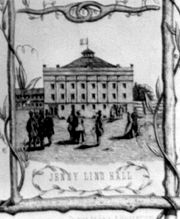
Jenny Lind
Johanna Maria Lind , better known as Jenny Lind, was a Swedish opera singer, often known as the "Swedish Nightingale". One of the most highly regarded singers of the 19th century, she is known for her performances in soprano roles in opera in Sweden and across Europe, and for an extraordinarily...
, known as the "Swedish Nightingale". Located at 624 Broadway, New York, across from Bond Street just south of West Third Street, the new theater was to be "one of the largest musical halls in the world," boasting one of the largest stages in New York.
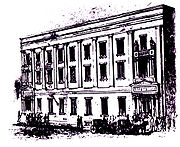
P. T. Barnum
Phineas Taylor Barnum was an American showman, businessman, scam artist and entertainer, remembered for promoting celebrated hoaxes and for founding the circus that became the Ringling Bros. and Barnum & Bailey Circus....
), but without the theater being built for her; instead, Miss Lind opened at New York City's Castle Garden. The theater that was to have opened with "the name of Jenny Lind [that] would attract attention all over the country", instead was later opened and was christened Tripler Hall, thereafter, playing numerous minstrel show
Minstrel show
The minstrel show, or minstrelsy, was an American entertainment consisting of comic skits, variety acts, dancing, and music, performed by white people in blackface or, especially after the Civil War, black people in blackface....
s, an entertainment then quite fashionable on the American stage.
There were a few notable exceptions to these theatrical diversions, demonstrating that Tripler Hall had a more legitimate reputation during this period. In December 1850 an important ceremonial meeting was attended by thousands of Freemasons of New York City at Tripler Hall, of which it was written: "the event was regarded and still is regarded [1899] as a landmark in the history of Freemasonry
Freemasonry
Freemasonry is a fraternal organisation that arose from obscure origins in the late 16th to early 17th century. Freemasonry now exists in various forms all over the world, with a membership estimated at around six million, including approximately 150,000 under the jurisdictions of the Grand Lodge...
in the history of New York." In February 1852 a memorial service was held at Tripler Hall for the renowned American novelist James Fenimore Cooper
James Fenimore Cooper
James Fenimore Cooper was a prolific and popular American writer of the early 19th century. He is best remembered as a novelist who wrote numerous sea-stories and the historical novels known as the Leatherstocking Tales, featuring frontiersman Natty Bumppo...
, presided over by the noted statesman Daniel Webster
Daniel Webster
Daniel Webster was a leading American statesman and senator from Massachusetts during the period leading up to the Civil War. He first rose to regional prominence through his defense of New England shipping interests...
, with a eulogies said by Washington Irving
Washington Irving
Washington Irving was an American author, essayist, biographer and historian of the early 19th century. He was best known for his short stories "The Legend of Sleepy Hollow" and "Rip Van Winkle", both of which appear in his book The Sketch Book of Geoffrey Crayon, Gent. His historical works...
, and William Cullen Bryant
William Cullen Bryant
William Cullen Bryant was an American romantic poet, journalist, and long-time editor of the New York Evening Post.-Youth and education:...
. That same year William Thackeray concluded a national tour with a lecture at Tripler Hall.
The theater went through several different managers during this period, each manager naming the theater as he or she pleased. After burning down in 1854, the rebuilt theater was at last leased to Jenny Lind for her acclaimed Varieties and renamed the Jenny Lind Hall. During her residence there, she performed her famed music. Nevertheless, the "Swedish Nightingale" had competition when the theater was used for the American Art Union Distribution. The report in The London Illustrated News gives an interesting description of the interior of Tripler Hall:
- Never - not even on the nights of the "Nightingale" - has the capacity of Tripler Hall been more fully booked than the evening appointed for the distribution of the Art Union prices. The immense floor (30 feet wider than Kester Hall), the aisles, the galleries before the stage, and beside the doors, were crowded to excess.
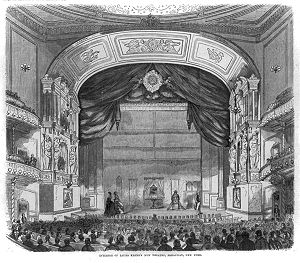
The Varieties of Miss Laura Keene
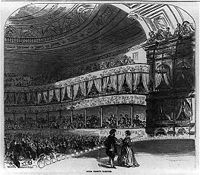
Laura Keene
Laura Keene was a British-born American stage actress and manager. In her twenty-year career, she became known as the first powerful female manager in New York.-Early life:...
reopened the theater as Laura Keene's Variety House with her original "musical extravaganza" featuring music by Thomas Baker. This production was rightly called Varieties, as it featured a range of entertainments, from singers to acrobats.
It was here in her newly renamed theatre that the leading female impresario
Impresario
An impresario is a person who organizes and often finances concerts, plays or operas; analogous to a film producer in filmmaking, television production and an angel investor in business...
of New York, Laura Keene, developed her talent for producing an eclectic form of entertainment which she would perfect in subsequent productions such as the musical Seven Sisters five years later.
Two rare etchings of the interior of the theater at this time depict two different productions by Laura Keene in her theater; one picture (right) shows what appears to be a contemporary domestic comedy, with four figures on the stage in various positions (including a man in a pants suit seated in a chair in a comic posture to the right); a second picture (left), from the point of view
Perspective (visual)
Perspective, in context of vision and visual perception, is the way in which objects appear to the eye based on their spatial attributes; or their dimensions and the position of the eye relative to the objects...
from the stage, depicts what is probably the production of a classical text, with two figures in historical costumes standing downstage close to the footlights. Together, these two etchings—from both the actors' and the audience's points of view—give a rare glimpse into theatrical production on the American stage in the pre-Civil War era.
Despite the success of the theater under the management of Laura Keene, the Panic of 1857
Panic of 1857
The Panic of 1857 was a financial panic in the United States caused by the declining international economy and over-expansion of the domestic economy. Indeed, because of the interconnectedness of the world economy by the time of the 1850s, the financial crisis which began in the autumn of 1857 was...
bankrupted the theater and it was forced to be closed once again.
Later next year, on December 30, 1857, John Burton took over management and renamed the theater simply Burton's New Theatre with the opening of his musical burlesque Columbus El Filibustero!! In 1858, Joseph Jefferson
Joseph Jefferson
Joseph Jefferson, commonly known as Joe Jefferson , was an American actor. He was the third actor of this name in a family of actors and managers, and one of the most famous of all American comedians....
performed in a burlesque of the play Mazeppa
Mazeppa
-Places:United States* Mazeppa, Minnesota* Mazeppa, Pennsylvania* Mazeppa Township, Wabasha County, Minnesota* Mazeppa Township, South DakotaAustralia* Mazeppa National Park-People:* Ivan Mazepa, known also as Mazeppa, a Ukrainian Cossack hetman...
by F. A. Brady in which he was drawn across the stage atop a Crandall horse.
Dion Boucicault and the naming of the theatre
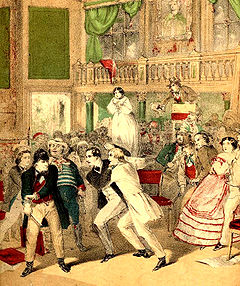
Dion Boucicault
Dionysius Lardner Boursiquot , commonly known as Dion Boucicault, was an Irish actor and playwright famed for his melodramas. By the later part of the 19th century, Boucicault had become known on both sides of the Atlantic as one of the most successful actor-playwright-managers then in the...
, called "the most conspicuous English dramatist of the 19th century", tried his hand at management, took over the theater, and gave the theater its final name of The Winter Garden Theatre with the opening of his original burlesque
Burlesque
Burlesque is a literary, dramatic or musical work intended to cause laughter by caricaturing the manner or spirit of serious works, or by ludicrous treatment of their subjects...
Chamooni III on October 19, 1859. The theatre was aptly named The Winter Garden because Boucicault remodeled the theater extensively, surprisingly cutting the auditorium in half and installing "artificial tropical plants after a Parisian prototype." Boucicault effectively turned the theater into a "winter garden" in the fall of the year. Among Boucicault's stable of first-rung actors were Joseph Jefferson
Joseph Jefferson
Joseph Jefferson, commonly known as Joe Jefferson , was an American actor. He was the third actor of this name in a family of actors and managers, and one of the most famous of all American comedians....
, Agnes Robertson
Agnes Robertson
Agnes Robertson Robertson was an Australian Senator for Western Australia.She was elected to the senate in 1950 as a Liberal Party representative; in 1955 she switched her allegiance and represented the Country Party for the remainder of her parliamentary service; for this reason she is regarded...
, and Mrs. John Wood
Mrs. John Wood
Mrs. John Wood , born Matilda Charlotte Vining, was an English actress and theatre manager.-Biography:...
. Boucicault's dramatization of Charles Dickens
Charles Dickens
Charles John Huffam Dickens was an English novelist, generally considered the greatest of the Victorian period. Dickens enjoyed a wider popularity and fame than had any previous author during his lifetime, and he remains popular, having been responsible for some of English literature's most iconic...
's Christmas story Cricket on the Hearth was his opening production, starring Jefferson as Caleb Plummer and Robertson as Dot; this immensely popular production eventually toured, as one critic has said, to "every possible playhouse in English-speaking America."
The sensational premiere of The Octoroon
That winter, on December 5 of 1859, Boucicault premiered one of his most popular - and controversial - melodramas The OctoroonThe Octoroon
The Octoroon is a play by Dion Boucicault, which opened in 1859 at The Winter Garden Theatre. Boucicault adapted the play from the novel The Quadroon by Thomas Mayne Reid . It concerns the residents of a Louisiana plantation called Terrebonne. The play was very popular in its day, and sparked...
, subtitled "Life in Louisiana", which he had adapted from the novel The Quadroon by Thomas Mayne Reid
Thomas Mayne Reid
Thomas Mayne Reid , was an Irish-American novelist. "Captain" Reid wrote many adventure novels akin to those written by Frederick Marryat and Robert Louis Stevenson. He was a great admirer of Lord Byron...
. The Octoroon, dealing with people of mixed white and African heritage, caused nothing short of a sensation, to see on the stage a drama that provoked discussions about race and politics. About this new phenomenon, The New York Times wrote that it had become "the great dramatic sensation of the season":
- Everybody talks about the Octoroon, [sic] wonders about the Octoroon, goes to see the Octoroon; and the "Octoroon" thus becomes, in point of fact, the work of the public mind...the public having insisted on rewriting the piece according to its own notions, interprets every word and incident in wholly unexpected lights; and, for aught we know, therefore, the "Octoroon" may prove after all to be a political treatise of great emphasis and significance, very much to the author's amazement.
The newly named Winter Garden Theatre eventually became home to a series of musical extravaganzas and burlesques: Cinderella with music by Charles Koppitz and a text by Charles Dawson Shanley on September 9, 1861, The Wizard's Tempest by Charles Gayler, on June 9, 1862, and King Cotton by Charles Chamberlain on June 21, 1862.
Enter Edwin Booth
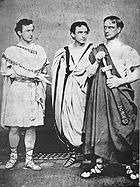
Edwin Booth
Edwin Thomas Booth was a famous 19th century American actor who toured throughout America and the major capitals of Europe, performing Shakespearean plays. In 1869 he founded Booth's Theatre in New York, a spectacular theatre that was quite modern for its time...
took on the management of the Winter Garden Theatre (together with his brother-in-law, John Sleeper Clarke
John Sleeper Clarke
John Sleeper Clarke , 19th century American comedian and actor, was born in Baltimore, Maryland, and was educated for the law. In his boyhood he was a schoolmate of Edwin Booth who was born in the same year as he, and with whom he engaged in amateur dramatic readings as members of the Baltimore...
) with the intention of shifting the focus from musicals and burlesques to classical dramas. This enterprise included a toga-clad, one-night production of Julius Caesar
Julius Caesar (play)
The Tragedy of Julius Caesar, also known simply as Julius Caesar, is a tragedy by William Shakespeare, believed to have been written in 1599. It portrays the 44 BC conspiracy against...
on the evening of November 25, 1864, played by Edwin and his brothers, John Wilkes Booth
John Wilkes Booth
John Wilkes Booth was an American stage actor who assassinated President Abraham Lincoln at Ford's Theatre, in Washington, D.C., on April 14, 1865. Booth was a member of the prominent 19th century Booth theatrical family from Maryland and, by the 1860s, was a well-known actor...
and Junius Brutus Booth, Jr.
Junius Brutus Booth, Jr.
Junius Brutus Booth, Jr. was an American actor and theatre manager.As a member of the illustrious Booth family of actors, Junius Brutus Booth, Jr. was overshadowed not only by his father Junius, Sr...
The goal of staging Julius Caesar for just one night was to raise funds for the establishment of a statue of William Shakespeare
William Shakespeare
William Shakespeare was an English poet and playwright, widely regarded as the greatest writer in the English language and the world's pre-eminent dramatist. He is often called England's national poet and the "Bard of Avon"...
designed by J. Q. A. Ward in the relatively new Central Park
Central Park
Central Park is a public park in the center of Manhattan in New York City, United States. The park initially opened in 1857, on of city-owned land. In 1858, Frederick Law Olmsted and Calvert Vaux won a design competition to improve and expand the park with a plan they entitled the Greensward Plan...
on the northern outskirts (then) of Manhattan
Manhattan
Manhattan is the oldest and the most densely populated of the five boroughs of New York City. Located primarily on the island of Manhattan at the mouth of the Hudson River, the boundaries of the borough are identical to those of New York County, an original county of the state of New York...
. Tickets went for sale for a (then) astounding price of five dollars. Considering the way history was to unfold, it is curious that it was Edwin Booth
Edwin Booth
Edwin Thomas Booth was a famous 19th century American actor who toured throughout America and the major capitals of Europe, performing Shakespearean plays. In 1869 he founded Booth's Theatre in New York, a spectacular theatre that was quite modern for its time...
who played the role of Brutus
Brutus
Brutus is the cognomen of the Roman gens Junia, a prominent family of the Roman Republic. The plural of Brutus is Bruti, and the vocative form is Brute, as immortalized in the quotation "Et tu, Brute?", from Shakespeare's play, Julius Caesar....
, assassin of Julius Caesar
Julius Caesar
Gaius Julius Caesar was a Roman general and statesman and a distinguished writer of Latin prose. He played a critical role in the gradual transformation of the Roman Republic into the Roman Empire....
, and the role of Marc Antony was played by John Wilkes Booth
John Wilkes Booth
John Wilkes Booth was an American stage actor who assassinated President Abraham Lincoln at Ford's Theatre, in Washington, D.C., on April 14, 1865. Booth was a member of the prominent 19th century Booth theatrical family from Maryland and, by the 1860s, was a well-known actor...
, while "lean and hungry" Cassius was given to the heavier built Junius Brutus Booth, Jr.
Junius Brutus Booth, Jr.
Junius Brutus Booth, Jr. was an American actor and theatre manager.As a member of the illustrious Booth family of actors, Junius Brutus Booth, Jr. was overshadowed not only by his father Junius, Sr...
.
In the handbill promoting the production (right), it stated that there would appear, for one night only, "The Three Sons of the Great Booth." The three Booth brothers were then listed, from oldest to youngest, Junius, Edwin, and John, and beneath this, the Latin phrase that left no doubt that the entire production was dedicated to their father, the great tragedian Junius Brutus Booth
Junius Brutus Booth
Junius Brutus Booth was an English actor. He was the father of John Wilkes Booth , Edwin Booth , and Junius Brutus Booth, Jr., an actor and theatre manager...
: Filii Patri Digno Digniores.

American Civil War
The American Civil War was a civil war fought in the United States of America. In response to the election of Abraham Lincoln as President of the United States, 11 southern slave states declared their secession from the United States and formed the Confederate States of America ; the other 25...
tried to burn the city to the ground, which included fires set in the Lafarge House, which abutted the rear of The Winter Garden Theatre. About a half hour into the performance, during the first scene of Act Two, when Brutus was pacing in his orchard, contemplating his pending assassination of Caesar, the clang and clatter of horse-drawn fire engines could be heard from the street outside. It seemed that there was a fire next door in the Lafarge House which threatened to engulf The Winter Garden Theatre. Before panic could consume the audience, Edwin stepped to the footlights to calm the audience.
The brothers Booth play Julius Caesar as New York burns
The fire at the Lafarge House that almost spread to The Winter Garden Theatre had been set by sympathizers to the cause of the Confederacy with the intention of burning New York to the ground during these, the last months of the Civil War. At the Lafarge House, someone had set fires in the front parlor and had emptied a bottle of phosphorus on the furniture throughout a room on the third floor.In describing this "diabolical plot to burn the City of New York," which The New York Times called "one of the most fiendish and inhuman acts known in modern times," it was reported under a banner heading:
- THE EXCITEMENT AT WINTER GARDENS
- When the alarm of fire was given at the Lafarge the excitement became very intense among the closely-packed mass of human beings in [the] Winter Garden Theatre adjoining the Lafarge, and but for the presence of mind of Mr. BOOTH, who addressed them from the stage of the theatre, telling them there was no danger, it is fearful to think what would have been the result. There was only the usual number of policemen and watchmen in attendance, and the panic was such for a few moments that it seemed as if all the audience believed the entire building was in flames, and just ready to fall upon their devoted heads. In addition to what Mr. BOOTH said from the stage, Judge McCLUNN rose in the dress circle, and in a few timely remarks admonished them all to remain quietly in their places, and at the same time tried to show them the danger which would attend a pell-mell rush for the doors, and especially the uselessness of it, inasmuch as the theatre part of the building was known to be on fire. The presence of a squad of policemen soon after so reassured the audience that with a few exceptions, they remained until the close of the performance.
The city was saved, as was The Winter Garden Theatre.
The production of Julius Caesar proceeded. The production was the first – and only – time that the three sons of one of America's great tragedians, Junius Brutus Booth
Junius Brutus Booth
Junius Brutus Booth was an English actor. He was the father of John Wilkes Booth , Edwin Booth , and Junius Brutus Booth, Jr., an actor and theatre manager...
, performed together on the same stage. The production raised $3,500 for the building of the statue of Shakespeare in Central Park, which stands there today.
Booth performs the "Hundred Nights Hamlet"
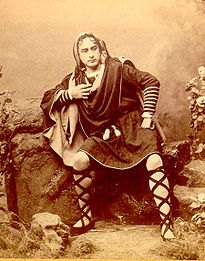
Hamlet
The Tragical History of Hamlet, Prince of Denmark, or more simply Hamlet, is a tragedy by William Shakespeare, believed to have been written between 1599 and 1601...
" a record which stood for fifty-six years.
The Hamlet of Edwin Booth
Edwin Booth
Edwin Thomas Booth was a famous 19th century American actor who toured throughout America and the major capitals of Europe, performing Shakespearean plays. In 1869 he founded Booth's Theatre in New York, a spectacular theatre that was quite modern for its time...
is well documented in reviews and diaries of those who saw the production. One review, appearing in Harper's shortly after the run of "the hundred nights Hamlet" summarized what Edwin Booth
Edwin Booth
Edwin Thomas Booth was a famous 19th century American actor who toured throughout America and the major capitals of Europe, performing Shakespearean plays. In 1869 he founded Booth's Theatre in New York, a spectacular theatre that was quite modern for its time...
had accomplished during this important portrayal - a production which, perhaps more than any other single production in American stage history, solidified one of the great roles in dramatic history with a single actor. As a critic from the era then wrote: "A really fine actor is as uncommon as a really great dramatic poet. Yet what Garrick was in Richard III or Edmund Kean in Shylock, we are sure Edwin Booth is in Hamlet."
The "Grand Revivals"
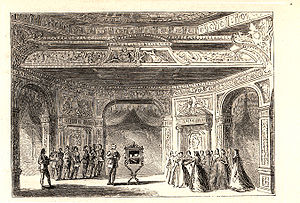
Othello
The Tragedy of Othello, the Moor of Venice is a tragedy by William Shakespeare, believed to have been written in approximately 1603, and based on the Italian short story "Un Capitano Moro" by Cinthio, a disciple of Boccaccio, first published in 1565...
, with Booth in the title role.
Finally, in February 1866, after his return to the stage after a self-imposed retirement due to the assassination of President Abraham Lincoln
Abraham Lincoln
Abraham Lincoln was the 16th President of the United States, serving from March 1861 until his assassination in April 1865. He successfully led his country through a great constitutional, military and moral crisis – the American Civil War – preserving the Union, while ending slavery, and...
by his brother John, Booth played his acclaimed Richelieu, followed in January 1867 by a spectacular production of Merchant of Venice that was considered one of the finest productions of that play during the 19th century.
The final fire for a grand showplace
On Wednesday, March 25, 1867, a fire broke out under the stage which eventually burned the Winter Garden Theatre to the ground.- A fire broke out about 8:40 o'clock on Saturday morning beneath the stage of the Winter Garden Theatre, resulting in the entire destruction of that establishment, and doing considerable damage to the Southern Hotel, formerly known as the Lafarge House. Although the Fire Department was promptly on hand, in an incredibly short space of time the flames had wrapped the entire interior of the Winter Garden in a sheet of fire, and the firemen were unable to work therein owing to the intense heat...By 9 o'clock the flames had reached their limit and the spectacle was one of peculiar grandeur and effect...At 9:15 the roof of theatre fell...The aggregate loss is roughly estimated at $250,000. Both the theatre and the hotel are owned by the Lafarge estate, as also the "stock" scenery and properties of the former...Messrs. EDWIN BOOTH and W. STUART also suffer severe losses. These gentlemen were the joint lessees and managers of the Winter Garden, and their extensive and valuable wardrobes, used in the recent Shakespearean revivals, as well as a large amount of new scenery and properties, were all destroyed by the flames. These articles were valued at $60,000 and uninsured...Mr. BOOTH is a heavy loser by the total destruction of his private wardrobe and many valuable presents. This wardrobe was considered to be the most extensive and valuable one in the possession of any single actor on this continent.
Rather than rebuild the theater once again, Booth decided to erect his own theater twenty blocks uptown on newly fashionable West Twenty-Third Street on the corner of Sixth Avenue, to be called Booth's Theatre
Booth's Theatre
Booth's Theatre was a theatre in Manhattan built by actor Edwin Booth. Located on the southeast corner of 23rd Street and Sixth Avenue, Booth's Theatre opened on February 3, 1869....
.
The site was then occupied by the Grand Central Hotel
Grand Central Hotel
The Grand Central Hotel, later renamed the Broadway Central Hotel, was a hotel at 673 Broadway, New York City, that collapsed on August 3, 1973, killing four residents and injuring at least twelve.-History:...
, and is today the location for the New York University School of Law's Mercer Street Residence.

